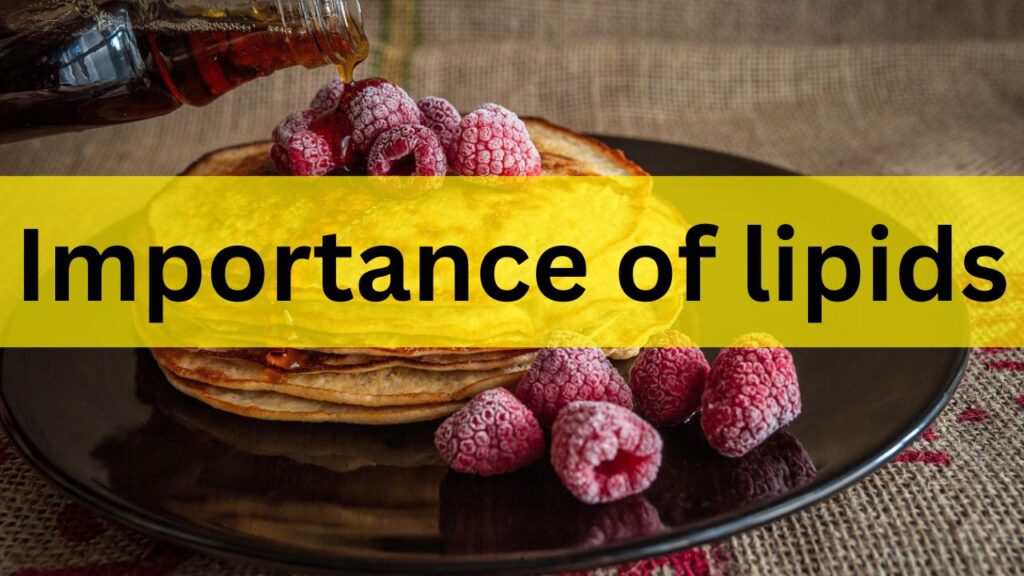Importance of lipids in the human body? To many people, when they hear the word “fat” or “lipid,” they think of something unhealthy that should be avoided. But reality is quite different. Lipids are one of the important nutrients of life. Without some lipids, your brain wouldn’t work quite right, your nerves couldn’t send signals, your body couldn’t absorb certain vitamins, and you’d have a really hard time keeping up either energetically or thermally, that is with energy or body heat.
In truth, lipids are more than “stored fat.” They contribute to providing energy, making cell structures, protecting important organs, even in helping you remember and learn. Scientists believe that lipids make up around 10 percent of the human body, but their role is much larger than that number would suggest.
In this piece, we’ll be breaking down the multitude of purposes lipids serve within the human body, how important they are for health and why you should never go too low on them in a diet. Let’s dive deeper.
Table of Contents
Importance of lipids in the human body?
Lipids are the chief store of energy in human body. One gram of lipid provides about 9 kcal of energy – almost double the amount in either carbohydrates or proteins (both of these are ~4 kcal/g, as has already been mentioned).

How Lipids Provide Energy
When you consume high-fat foods, test subjects’ bodies store excess lipids in fat tissue.
When you fast, exercise or just don’t eat enough, the body releases stored fat to cover your energy needs later.
This operation is one that helps you stay alive when food is scarce or you’re exerting yourself over a long period of time.
Real-Life Example
Take marathon runners: Once their carbohydrate stores (glycogen) are depleted, their bodies depend on fat to sustain them.
Key Point:
The lipids are a backup battery, so the body never runs out of energy.
Brain Cells Are 60% Fat
One of the fattiest organs in your body is your brain. Approximately 60% of the dry weight of the brain is made up of lipids, in particular long chain polyunsaturated fatty acids such as Omega-3 (DHA) and Omega-6 (ARA).
Why This Matters:
These are lipids that are components of the cell membranes of brain cells, or neurons.
They enhance communication between brain cells.
Another potential benefit of omega-3 is improved memory, focus and learning.
A deficit can result in issues such as depression, memory loss and poor concentration.
Case Study:
Children who ate the most Omega-3 performed significantly better than those who ate the least Omega-3 according to research published in The American Journal of Clinical Nutrition, in learning and memory.
Tip: Eat the Omega-3 fats found in fish, flaxseed and walnuts to keep your brain sharp.
Phospholipid is such a fat which actually makes up milelin.
Mechanism: Myelin Sheath (surrounded by a layer of phospholipids around nerves)
Phospholipids are a particular class of lipids that form the the myelin sheath, which protects nerve fibers.
Functions of Myelin:
Speeds up nerve signal transmission.
Protects nerves from damage.
Keeps your mind sharp and agile.
In the absence of lipids, the myelin sheath becomes fragile and may cause nerve diseases, like multiple sclerosis (MS).
Practical Example:
Think of electrical wires encased in plastic. No plastic, the electricity would drop off. And, just like you can’t have effective weir without lipids, or catenanes till there are catenanes, without myelin (also lipids), your nerves can’t really transmit messages.

Lipids in Body Architecture
Lipids are not just energy sources ― they are part of the body.
Key Roles:
Cell membranes are primarily composed of lipids (phospholipids, cholesterol, glycolipids).
Lipids provide structure and flexibility to cells.
The brain and spinal cord also have high lipid content.
Nutrient Comparison Between Body Hierarchy And Body Form.
Carbohydrates
Quick energy
Glucose in blood
Build muscles, enzymes
Hemoglobin, collagen
Lipids
Cell membranes, brain, nerves
Phospholipids, cholesterol
Takeaway: Your body’s cells would fall apart without lipids, which they need for walls.
Lipids Importance in Body Temperature
What Lipids Do to Keep One Warm
Lipids also act as insulators. They are deposited under the skin (on the surface as subcutaneous fat) to help avoid heat loss.
Functions:
Keep body in cold while warm.
Help retain heat produced inside.
Cushioning organs from injury.
Example:
Polar bears and whales have a thick layer of fat (blubber) which keeps them warm in the freezing temperatures of the Arctic. As is also the case with humans: they use fat to control their temperature and to shield their internal organs.
Tip: Extremely low body fat percentage can cause you to get cold, feel weak, and have hormone issues.
Lipids importance in Vitamins
Contribution of Lipids to Fat-Soluble Vitamin Absorption
Some vitamins do not get absorbed without fat being present. These group of the vitamins are the fat-solubles vitamins A, D, E, and K.
Vitamin A → For eyes and skin.
Vitamin D → Strengthens bones.
Vitamin E → It is antioxidant.
Vitamin K → An essential element for the coagulation of blood.
These vitamins cannot dissolve and be absorbed in the bloodstream without lipids.
Example:
If you eat carrots (which are high in Vitamin A) without some fat, your body will assimilate hardly none of it. But eating them with a bit of oil boosts absorption.

Lipids importance in foods
Functions of Lipids in Food and Satiety
Foods are much more than a source of calories.
Benefits:
Enhance the flavor, texture and smell of your food.
Provide a sense of fullness (satiety) after eating.
Aid in slowing digestion, so you don’t get hungry as quickly.
Example:
Vegetable-only salads may leave you hungry quicker. But the olive oil or avocado contributes healthy fats — and a more satisfying meal.
DICLAIMER
Medical Disclaimer
This content is purely informational. It is not intended to be a substitute for professional medical advice, diagnosis, or treatment. As always, talk to your doctor or healthcare provider if you have any questions about your health status or diet.
Conclusion
Lipids are not your enemy. They are life-sustaining compounds that furnish you with energy, safeguard your organs, build your brain and nerves, assist in vitamin absorption, and even make your food taste better. The trick is striking a balance: too little lipids can lead to nutrient deficiencies and nerve problems, while too much bad fat can lead to obesity and heart disease.
Key Takeaways:
Lipids contain more energy than any other nutrient.
Approximately 60% of your brain is composed of lipids.
One way that they protect nerves is through a coating around the nerves called myelin.
They are a major component of the cell membrane.
Lipids also are needed to keep us warm and to cushion our vital organs.
They are needed to absorb the fat soluble vitamins (A, D, E, K).
They have flavor and they fill you up.
Final Release: Always favor healthy fats in fish and plants (like Omega-3 and other unsaturates) over unhealthy trans fats and high amounts of saturated fats.
Hello everyone, I am Md Habibullah Sheikh a registered Pharmacist with 6 years of experience in Clinical, Community, and corporate pharmacy. I have worked for HLFPPT, Gauripur Hospital, Reliance Retail Pharma (Netmeds) as well and Now working for Zota Health Care as a Senior Pharmacist. We, In Health Easy Fitness, share trustable health education, tips & awareness to help people find the best health choice. Always talk to a doctor before taking any kind of Health issue Decision.


